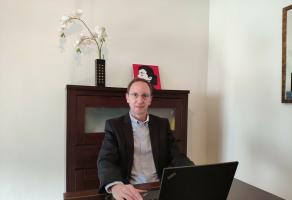Ibón de la Cruz: «We all have wounds caused by our family»
Many people, human beings, tend to assume that mental health is something that depends on each one: an issue that can be limited to a simple "to be mentally strong" or not to be, or in any case, to suffer or not suffer from a disease that appears spontaneously in the brain.
From this point of view, developing a psychological disorder is something that concerns only the individual, whose quality of life is diminished by the disease. However, reality shows us that mental health is much more complex. In fact, family relationships have a significant influence in this regard.
To learn more about this phenomenon, we have interviewed the psychologist Ibón de la Cruz, who has been working with what is known as "family wounds" or "family wounds", which are behind many of the reasons that lead people to seek professional help in psychotherapy.
- Related article: "Family therapy: types and forms of application"
Interview with Ibón de la Cruz: the wounds of the family
Ibón de la Cruz Apaolaza is a psychologist and trainer
with more than 20 years of experience in the field of psychotherapy. Currently, in addition to creating and offering courses and training programs through its Personal Resources online platform, it performs a psychological support in situations such as low self-esteem, grief due to loss of loved ones, separation crises, depression or stress labor. In this interview, specifically, Ibón tells us about the emotional wounds that can become entrenched in families.What do we understand by family wounds from the point of view of Psychology? In what forms of discomfort are they expressed more?
We all have wounds caused by our family to a greater or lesser extent. The range is very wide, and ranges from toxic situations to abuse of all kinds.
Let us bear in mind that a series of taboos and prejudices that make it very difficult to deal with problems: for example, society does not admit that a mother can be a psychopath or that the parents may be drug addicts. Although we also often find ourselves with the wounds that the younger generations produce to the older ones.
Those wounds can sometimes be overcome without doing anything special. But there are situations and experiences that affect us deeply and weigh us down throughout our lives. Therefore, the best strategy is always to face them, although there are many people who prefer to hide them.
The consequences and effects can be of all kinds, and are cumulative: in the end, they can cause discomfort, addictions, generalized anxiety, eating disorders and even suicides. The list is very wide. The bad thing is that those who have not experienced this type of situation are not able to understand what people who have experienced it feel.
Generally, in consultation, the disorders that appear most frequently are those derived from anxiety and depression, often derived from a post-traumatic stress syndrome.
Is it often that family wounds are passed from one generation to another for a long time, instead of staying only in "problems" that children inherit from their fathers and mothers only once and that do not pass to the next generation?
Yes: that is called “family chains”.
It is amazing to see how some harmful patterns of behavior are passed down from generation to generation, often from a very long time ago. And the first step to overcoming these patterns is realizing that they exist.
In fact, I always express my admiration when I meet people who have experienced familiar situations really harsh and have had the courage and awareness not to pass on that pattern of behavior to their sons. They have decided that this story ends with them and that from that moment on, the way the family relates will be totally different.
It is also common that, of several siblings, it is one who decides to end this way of acting while the others decide to perpetuate it, so often the first one is marginalized from the core family.
Let us remember that every family structure has its winners and losers and that generally those who have benefited the most will be the most interested in not changing things.
Do you think that when studying and trying to understand emotional well-being, much emphasis is usually placed on individual and not so much in his most significant personal relationships, such as those with relatives?
Yes. Currently, many approaches are too personal. They do not take into account such obvious aspects as power relations in the family, work environment or socioeconomic position.
Let us bear in mind that the prevailing approach in society is that of individual happiness, which by definition is a self-absorbed and individualistic way of seeing life. It has been found that the level of happiness-unhappiness is not a good predictor of numerous psychological problems.
However, living a life with meaning and purpose is a good predictor of mental health. And that way of seeing life implies contributing something to society, to the community.
In any case, we have to clarify that the relationship with the family is evolving. It is not uncommon to find that over time many people create an environment of people who are not family members with whom they maintain affectionate relationships and who become their new family.
But we must not forget that no one is an island, that the human being is a social creature and that we need to feel loved, listened to and accepted to achieve a minimum of emotional well-being. And all this can be done with people who may or may not belong to the family nucleus.
On the other hand, it must also be said that the media have inflated the importance of partner, in such a way that many people who, for one reason or another, do not have a partner, feel failed.
In this crazy search for individual happiness that we are living, we forget that coexistence and human relationships are a deep source of affection and well-being.
Can family wounds be observed at a "macro" level in certain generations marked by a very strong crisis? For example, with the outbreak of a war or a pandemic such as the coronavirus. Not all families suffered in the same way, but there may be some statistically detectable trends.
It is very curious what happens at the generational level. Often by generation (recall the baby boomer generation) living conditions were harsh and family relationships did not meet what are now considered the standards for development healthy. To give an example, when some people of that generation tell about their childhood experiences, we throw our hands in our heads, since today we would speak of "child exploitation".
However, we can see that people have generally had a balanced and productive life. And that is because they were "like the others", because they belonged to the average and their case was not exceptional. And that always helps to adapt to the environment, the environment and the times.
On the other hand, today the media and social networks transmit images of what is supposedly normal, that do not correspond to reality: We have lost connection with social reality and think that we are the rare.
For example, and focusing on family wounds, there are typical phenomena that can be detected statistically, such as mistreatment of parents by children.
In any case, the effects of the pandemic (and especially those of confinement) have been spectacular. People, to a great extent, have been forced to face what was inside them. They have found that escape strategies, through social life or travel, were not possible. And they have discovered that the human being, when he finds himself, can feel very bad, because he has been avoiding important things for too long. That is one of the reasons for the great increase in the consumption of psychotropic drugs.
Let us also remember that drugs can stabilize and attenuate symptoms, so they play a great role in crisis situations, but they do not solve anything. The work to be done is human, personal.
What can be the effects of family wounds on the development of children and adolescents who grow up in it?
A person who grows up in a toxic or hostile family can develop different problems, which if not healed, can last a lifetime.
One of them is what we call a great basal anxiety. That person has learned to feel anxious to protect themselves and later on they will be unable to turn off that anxiety, which will end up affecting all aspects of their lives.
You can also develop an inappropriate attachment style, in such a way that you can have serious problems when it comes to relating to others, even with the people who are most next.
If the person has been seriously abused (physically and/or emotionally) they will find it difficult to defend yourself and be respected, with which you will run the risk of receiving attacks from all kinds of psychopaths and predators.
We could go on talking about the consequences of family injuries for hours on end, but each case is unique and often has a combination of several aspects.
But I do not want to fail to highlight an aspect that is often surprising: family wounds, once healed, leave us gifts. Generally, people who have overcome their wounds have learned lessons and have developed skills that are difficult to understand by those who have not experienced a similar situation. For example, I have observed time and time again that many people who have overcome their family wounds become wonderful guides for people who are experiencing similar problems.
What effective strategies and techniques can be used from psychotherapy in the face of this kind of problem?
In my case, I do not work with families, but with people who have suffered from problematic family situations. There are many techniques and resources, but let's remember that each person's itinerary is different. A personalized and “tailor-made” design is needed, adapted to the person, their experiences, their current situation and their abilities.
The first phase is to become aware of the situation and explore the problem to its source. Once the person has understood and is aware, it can be said that half the work is done.
Then, the personalized design and strategy are created, with different techniques and resources. It should be noted that everything that is done is agreed between client and therapist. If the client doesn't want to do something, he doesn't do it directly, no problem.
I would not like to end this interview without drawing attention to the damage that false ideas and images spread by movies and television series do to the process of psychotherapy. People often think of psychotherapy as seizures, crying, trauma visualization, and exorcism-like scenes.
In reality, psychotherapy is a mostly calm, comfortable and pleasant process, in which the client is loaded with strength and resources. Clients are often surprised at how important a role humor and wellness play in the healing process.
Let us not forget that one of the keys to psychotherapy is to create an environment of total security and trust in that the person can resume the development of aspects that at some point in her life were blocked. And let's not forget that an improvement in any aspect also implies an increase in general well-being.



